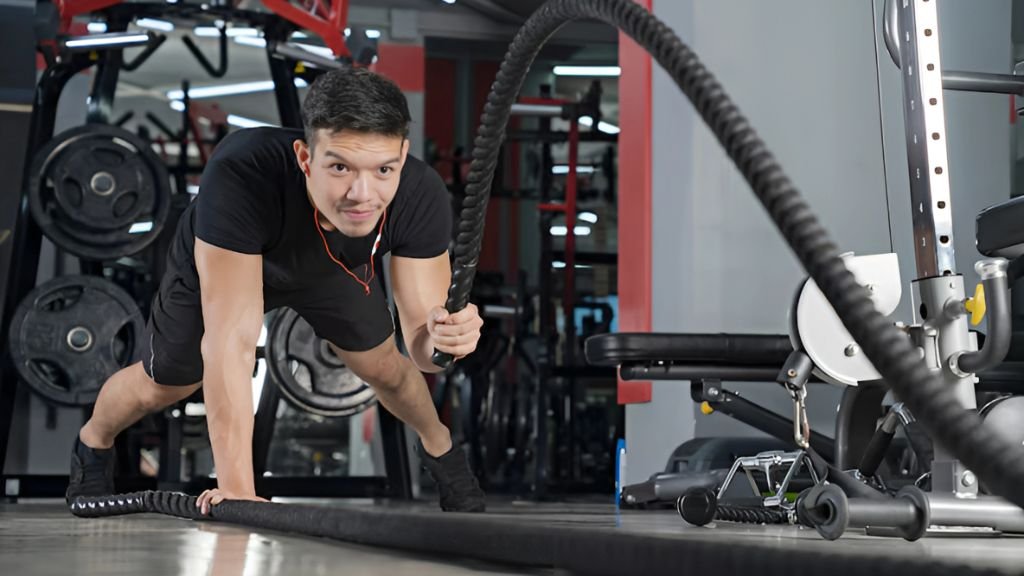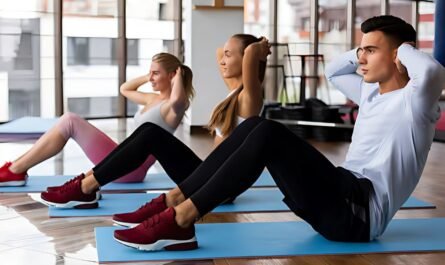What was your most unique experience working out at a gym? : Exercise could bring unexpected side-effects. Not all muscle gains and endurance gains result from exercise; for instance, your arms might get so exhausted they cannot lift your blow dryer or you become sleepy but can’t find new socks to put on your feet! These unexpected side-effects should all be expected and should not come as any surprises when exercising first-time around.
I know all too well the feeling. In the past, I used to engage in what’s known as “yo-yo” exercise – going for periods spanning anywhere from several weeks or months before falling off again due to life circumstances or unexpected commitments. After taking breaks for as long as was needed between sessions of exercise to give both my body (and brain!) a chance to adjust before returning back into it again.
Over the years, exercising has brought me many unexpected rewards, which became evident as I began exercising regularly again and again. Moving was far easier following an intensive summer of resistance training (compared with last year, where even walking just several steps was exhausting!). I will always remember how great it felt that first time when leaving boxing class thinking “This challenge seemed impossible yet I successfully completed the move!”
Working out is full of surprises: from amazing to irritating to mind-boggling effects. At first, this might leave you wondering “is this normal”; don’t fret: your body needs time to adapt to exercising; certain effects should dissipate with regularity while some incredible side benefits linger long afterwards (I keep returning back for them, to be honest.). However, don’t get discouraged; your body will adjust over time!
How to Start
Before diving in and discussing what we should expect from our workout, let’s first cover how to actually begin exercising. It is key that you know it’s entirely your choice which form of physical activity you engage in; running is certainly not mandatory! When starting on fitness journey it is vital that we experiment with various workout types until we discover our ideal match; after all, effective fitness workout is one in which people enjoy engaging!
Discovering why you exercise is key to creating an ongoing fitness regime. “When starting off on your fitness journey, it can be easy to get caught up in what everyone else is doing,” according to Jen Comas CPT co-founder of Girls Gone Strong previously spoke about with Self. Keep in mind that everyone moves at their own pace; focus on what best fits and is enjoyable for yourself and your individual body!
On your initial exercise day, there will likely be logistical considerations as you begin from scratch. New equipment – even basic items to help facilitate easy movements – might be required of you when beginning.
Starting your fitness journey? Check out SELF Certified Awards’ sneakers, shorts, sports bras and leggings; here you will discover items we consider top of their class. Then it is essential that you determine an ideal moment and time for you to exercise (there is no one “best time”, however; exercising when convenient for both schedule and lifestyle is what’s most effective. Plan exercise routines to make sure that don’t miss an opportunity. Finally consult your physician prior to beginning an exercise regime for approval before commencing one; for advice on starting even if this is something new to start doing for the first time ever.
Benefits of Working Out
Exercise offers many benefits that you have likely heard about, one being its effectiveness in helping reduce stress levels; studies have proven this through decreasing cortisol while increasing levels of serotonin and endorphins which in turn provide individuals with psychotherapy as well as medication programs to address depression or anxiety issues. Exercise also boosts sleep quality, self-confidence and increases confidence which all play key parts in living a balanced and healthy lifestyle – thus emphasizing its significance within healthy lifestyle management plans.
Types of Workouts
Attain a healthy balance by including both cardiovascular and resistance training each week – this will enable the section on “dating” different workouts to come in handy. Once you know more about yourself and what makes you unhappy, identifying which exercises would suit your schedule best becomes much simpler. If running isn’t your preferred form of cardio exercise, that doesn’t need to be your go-to cardio activity – try swimming, cycling and walking as alternative forms, boxing or even high intensity interval training (HIIT). As with strength training: Yoga, bodyweight exercises and weight training can all provide excellent ways to build up muscle strength; you don’t have to pick exercises which don’t suit you; rather it is about finding those best suited to meet your specific needs and requirements.
What to Avoid
One of the primary mistakes beginner fitness enthusiasts make when they start working out is overtraining themselves, according to experts. Overtraining means taking on too much at once in a short amount of time such as hour-long exercises or daily training programs; to prevent burn out or injuries it’s wiser to begin small amounts and gradually build them into your routine over time.
Once we’ve covered the reasons and timing for exercising, let’s dive deeper. Let’s discuss eight indicators to watch out for when starting to work out – being aware of what awaits will keep you on the right path whenever hurdles appear; don’t fret over something “not working”, however; just wait patiently while reaping its many rewards and be encouraged by them as time progresses.
1. There’s a chance that you’ll be feeling swollen
Workouts produce small tears in muscle fibers that the rebuilding process needs to repair in order to increase strength, but recovery from those tears may leave you achy and stiff for one or more days afterwards, according to exercise physiologist Tom Holland (M.S. C.S.C.S, Bowflex fitness advisor & author of Beat the Gym). The discomfort experienced after training sessions within two or three days following them is known as delayed onset muscle soreness (DOMS).
While soreness may be expected when engaging in exercises unfamiliar to their muscles (even experienced gym goers), its impact can be further compounded if your body has never previously participated in physical exercise.
Beginners to exercise are at an initial disadvantage since their nervous systems haven’t become efficient at recruiting various muscles, according to Joel Seedman, PhD of Advanced Human Performance in Atlanta. According to Seedman’s assessment, your body doesn’t quite know how to fire everything properly yet or have as much motor control; your body gradually adapts as your go on exercising more frequently; initially however, stressing too many or under-straining specific muscle may cause soreness; this discomfort should dissipate over time thanks to your nervous system quickly adjusting quickly!
As Seedman states, at its core is an effect known as “repeated bout effect.” When your body first encounters certain exercises (especially ones which utilize eccentric movement or “lowering” as part of their exercise regimen) you’re likely to feel sore for several days as your muscles adjust themselves for subsequent workouts – studies show however that after one session alone you won’t likely feel quite so sore later or third time round when performing them!
There are various theories as to why repeated effects of an intensive training bout occur, including neuronal changes within muscle cells, the process of adaptation to exercise and our body’s response to inflammation; but none fully explain this process.
Cori Lefkowith C.P.T, an Orange County personal trainer and co-founder of Redefining Strength. To avoid discomfort at the outset, she suggests starting slowly: as explained by Cori. “Often when starting new workout routines they go all-out at first and end up so sore they cannot exercise for several days after,” claims Cori.
At times it may be challenging to establish a consistent exercise routine (and doing too much too soon can increase the chances of injury – for severe symptoms or persistent issues you should consult a medical provider immediately), according to Lefkowith there’s no hard and fast rule about how long someone should exercise after beginning; she advises 15 minutes three times weekly should suffice, with potential to add on as needed over time.
As your body adjusts to a good strain of exercise, discomfort will likely arise at first. “Don’t give up too soon though; keep working out regularly and your soreness should subside over time!” says Jennifer Leah Gottlieb CPT creator JLG Fitness JLG Fitness While waiting it can help to try stretching, gentle activity like walking or using heat/ice packs on sore muscles to ease them temporarily.
Research remains inconclusive on which option is the optimal remedy for soothing sore muscles; neither heat nor ice have much of an impactful on healing process, however they could make your stay more bearable while waiting. Take a look at both, then see which is more comfortable as you switch from one therapy to the other (here are nine ways you can manage with increased soreness.).
2. It is possible that you will notice your level of energy increase with time
As per Gottlieb, when beginning exercising for the first time it may initially feel draining; your body simply isn’t used to having so much energy throughout your day. Over time however, exercising has proven that its opposite effects become apparent: once adjusted your body should become more energised after your sessions – as Gottlieb says.
As part of their middle school science courses, Seedman notes: As you start exercising regularly, your muscles begin producing more mitochondria and capillary density; mitochondria are energy sources of cells; they help create greater power (ATP). Capillaries play an integral part in transporting oxygen throughout your body.” This could all add up to an extra boost when your body begins creating more capillaries – leading to additional exercise sessions when those capillary begin being built up by your body!
Studies support this claim: A PLOS One research article published over 100 students who complained of feeling tired and exhausted who participated in running 3 times each week for six weeks until fatigue returned; those assigned running showed less overall fatigue compared with those not running;
An analysis of 16 research studies with over 670 participants concluded that exercise sessions typically significantly boost endurance levels immediately following training, especially moderate intensity cardio workouts that ranged between 20-40 minutes in duration (longer or more intense exercises did not produce comparable effects, suggesting further research must be completed to achieve similar effects.) According to this review, most cardio workouts focused on moderate intensity exercises which had such benefits (note however that more research needs to be completed.)
3. The most restful night of your life may turn into a routine
Most people recognize the great benefit of exercising on maintaining similar or better quality sleeping as one of its main results. A National Sleep Foundation research study of 3081 participants, aged 18-85 years old, concluded that those participating in moderate to vigorous intensity workouts at least 150 minutes weekly experienced 66% lower risk for feeling tired upon awakening (which can be taken as an indicator of quality of restful restful sleep), according to self-reported information by participants themselves.
Doing your best in fitness means prioritizing sleep; Lefkowith suggests “making sure you get enough rest is key for recovery”, per Seedman’s research. He noted how, regardless of sleeping or not, your body heals damaged muscles quite readily regardless of sleep duration; though sleeping less could negatively impact hormone release (growth hormone and testosterone release at their highest concentrations during restful slumber). Therefore it’s critical that people get between seven to nine hours per night of restful slumber; most need around seven to nine hours).
Experts often advise avoiding exercising in the few hours leading up to bedtime as this could reduce sleep quality. Although this does not necessarily apply to all individuals, if you find that working out during an interrupted night of rest causes an increase in energy, this could indicate you being sensitive to stress – in which case earlier nighttime or morning exercise could help – it might even make sleeping better!
4. It is possible that you are feeling more hungry than normal.
If hunger sets in immediately following exercise, it could be more than your imagination: since more energy than usual has been burned up during exercise and you might need to replenish it somehow. “Increasing hunger appears to be highly individual-related; some experience it while others don’t”, Holland asserts.
When feeling hungry, don’t ignore its signals; take them as signs to fill your plate with nutritious options such as post-workout meals made up of carbohydrates and proteins to curb any feelings of being peckish (here’s an overview on how you can nourish yourself after exercising).
5. Stress could be easier to deal with as well as your attitude could be improved too.
Exercise’s positive benefits extend far beyond physical advantages; its immediate gratifying feeling after an effective workout (thank you, endorphins!) Exercising also has been proven to reduce stress for most people according to research by the American Psychological Association; an intense sweat session may serve to release all that pent-up emotion or displace negative ones from one’s thoughts altogether if that is necessary; working out outdoors offers fresh air as an added perk; after an exhausting day working out can give us time for ourselves, an essential aspect of self-care!
Regular exercise has profound effects on people’s mental health, such as depression and anxiety, according to the Anxiety Depression Association of America. Studies have proven the value of professional help when facing difficulty; exercise regimens have proven particularly helpful when combatting depression and other health conditions. Personally, I’ve discovered the value of regular exercise to treat anxiety effectively. With consistent physical activity comes less mental chatter and improved mood – something which keeps anxiety at bay much better. Even on days where exercise seems pointless or when motivation falters it remains one of the benefits I focus on when feeling lethargic or demotivated to keep going.
6. Your skin might break out.
Sweating more can increase your vulnerability to breakouts and acne breakouts, according to David Lortscher, M.D. Board-certified dermatologist of Curology in Curology. Perspiration during exercise creates the perfect moist environment for bacteria growth which leads to breakouts according to Dr Lortscher as explained to Self. Touching or wiping off dirty towels from behind treadmills could expose skin bacteria which spread further across it – this makes wiping clean towels after exercising an essential task because perspiration from exercising creates moisture for growth causing breakouts according to Dr Lortscher in Curology’s director David Lortscher told Self.
If you begin experiencing pimples shortly after beginning an exercise routine, there are a couple of strategies you can employ in order to diagnose. According to Dr. Lortscher, remove and wash sweaty exercise clothes before training in order to minimize skin acne; and cleanse immediately following each workout using an gentle cleanser that won’t foam too much so as not to dry the face out too much.
Avoid wearing foundation to the gym as this may clog pores more readily when mixed with sweat from exercise and breathing in. While your skin does still breathe in general, foundation may exacerbate its ability to block pores with sweat-based blocking agents like sunscreens.
7. It will happen that you have setbacks as well as moments when you’d rather quit
Realistically, sticking with any new program you start can be challenging and likely requires abandoning at some point. According to Lefkowith there will always be setbacks or plateaus along your journey and these challenges will test your dedication despite best intentions
Sometimes your commitment just isn’t enough. “There is no perfect. Don’t beat yourself up for missing one or two workouts,” Holland suggests. Just ensure that when something does throw your routine off track, that it gets back on track as quickly as possible – consistency is the name of the game here; having made bad choices myself in my fitness journey I now recognize there’s never an appropriate moment or reason not to start again if something slips between your fingers – the key being consistency versus randomness of exercise habits! After years of unintended fitness activity I finally understood there was never a bad moment to start back on course; always just better moments are present allowing us all to start again; one never knows exactly when one might slip back onto track again
“Share your goals. Find a trainer. Join group classes. Gather support from people you can count on when starting something,” Lefkowith advises, as setting monthly and daily goals helps stay motivated. Remember: we have all experienced difficulty starting something – you aren’t alone!”
8. Your confidence is bound to rise to new heights
Exercise can help boost your self-confidence. Gottlieb notes: “Exercise will test both mental strength and willpower, yet once you see how far past those self-limiting beliefs you’ve pushed to get in the gym you will gain strength to face whatever life throws your way,”
Lefkowith shares his insight, “My clients often gain more self-esteem through being empowered over their health, as they’ve experienced triumph in overcoming challenges they never thought were achievable in the gym.
Celebrate every success, no matter how small, as motivation to meet the goals you’ve set–both inside and outside the gym.



